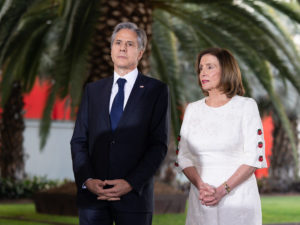
Secretary of State Antony J. Blinken hosts a Summit of the Americas Reception for Foreign Ministers on June 9, 2022, in Los Angeles, California, joined by Speaker of the U.S. House of Representatives Nancy Pelosi and Second Gentleman of the United States Doug Emhoff. [State Department Photo by Freddie Everett / Public Domain]
EA: Pelosi plans to go to Taiwan. The administration doesn’t want her to go. Some China watchers think a visit by the speaker of the House to Taipei could spark a new Taiwan Strait crisis. Others think calling off the visit now is knuckling under to Chinese demands. It’s a potential disaster, and with no real upside to any of it.
MK: I agree it is an unnecessary crisis, but Congress is not to blame. It is China’s fault. The Chinese Communist Party (CCP) does not get to decide where Americans can travel.
This dispute really crystalizes the stakes in the U.S.-China competition. The United States wants a “free and open” international system, where people are able to move and do business freely as they wish. And the CCP wants a system in which it gets to arbitrarily decide what is and is not permitted.
EA: We want a free and open international system. The problem—as always—is in the details. What do you do in places where it is too costly to force other states to maintain an open system? Taiwan has always been a fairly neat compromise that resolved some of this underlying tension: It gets to be a part of the international economy and enjoy domestic political arrangements of its choice, the United States gets to arm it for its own defense, but Taipei cannot explicitly call itself a state.
That compromise mostly meets Chinese, U.S., and Taiwanese interests. But Congress seems to be increasingly willing to shift away from that stance, potentially against the wishes of the administration.
MK: I agree the “One China” policy basically works and the United States should keep it in place. Consistent with that, Washington should also clarify its commitment to defend Taiwan in the event of a Chinese invasion in order to deter a Chinese military attack.
The Pelosi visit does not in any way change U.S. policy on these important matters. The CCP is unreasonable to get so upset.
EA: The big problem with that is that the Pelosi visit really can’t be viewed in isolation from other things happening in U.S.-China policy. In addition to a broad and growing division between the two states, the Biden administration has left most of the Trump administration’s trade tariffs in place, and the president has repeatedly misstated his support for Taiwan in a way that suggests that he, at least, no longer backs strategic ambiguity on Taiwan.
Meanwhile, we have a D.C. discussion where folks increasingly call for a policy shift on Taiwan, and a Congress that keeps trying to shift the goalposts, most recently legislation that seeks to designate Taiwan as a major non-NATO state ally of the United States. When you add it all together, you can see why a visit from the speaker of the House—something that hasn’t happened since 1997—would make the Chinese so touchy. There’s also a party congress coming up later this year, so there are Chinese domestic political considerations at play.
There’s some concern that the United States and China are engaged in the early stages of a security spiral; the security dilemma is a core concept in international relations, where misperceptions can end up driving states into unwanted conflict. In this case, Americans may think the Chinese are trying to manipulate them to weaken the United States, but it’s also possible Chinese leaders are just concerned about their own domestic power.
Read more here.
If you’re willing to fight for Main Street America, click here to sign up for the Richardcyoung.com free weekly email.





